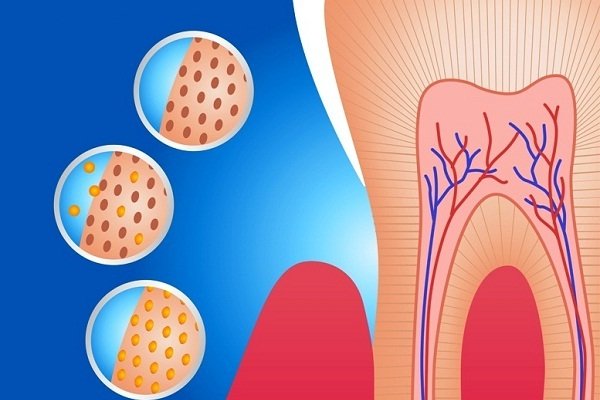
Tooth sensitivity is a common dental problem that involves uneasiness or sharp pain in teeth when coming in contact with certain substances and temperatures. The pain is usually sharp and sudden, but it is provisional. According to dental experts, the pain may affect the nerve endings of the teeth. Tooth sensitivity occurs when dentin loses its protective covering. Fortunately, tooth sensitivity may be treated and the condition can improve.
Finding the cause of the sensitive teeth is important to advocate a specific treatment. There are some home remedies that can ease tooth sensitivity naturally.
Natural remedies to relieve tooth sensitivity
If you have tooth sensitivity, you may try these natural remedies. They have potential active ingredients that may soothe your pain due to sensitive teeth.
Clove essential oil
The pain-relieving effect of clove oil helps in anesthetizing the affected tooth and gums and eases the pain almost instantly. The natural microbicidal property of clove oil may kill oral pathogens as well. Clove comprises of a strong chemical known as eugenol. It is equally an antiseptic and an anesthetic. It usually numbs the nerves and may prevent tooth sensitivity and further infection.
Tea tree oil
Tea tree oil has an antimicrobial and an anti-inflammatory property that may show a notable effect on the oral health of an individual. A survey states that many patients with tooth sensitivity feel that it works well in treating the pain due to sensitive teeth.
Peppermint essential oil
Peppermint comprises of menthol that has strong anti-bacterial properties. It may help to relieve tooth pain.
Salt water rinse
Doing a salt water rinse is a good way to cleanse the mouth. Salt has antiseptic property and may help in reducing inflammation by preventing bacterial growth in the mouth.
Cayenne pepper
It is usually a fairly hot chili pepper. Cayenne pepper contains capsaicin, an active ingredient that has a strong anti-inflammatory property that may help in reducing swelling of gums and tooth pain.
Garlic
Garlic exhibits anti-inflammatory and antimicrobial properties that help in treating sudden pain caused by sensitivity and fight against oral pathogens. When the garlic cloves are crushed, allicin is released. Allicin exhibits a natural antibacterial property, and it may help to relieve the tooth pain.
Cucumber
It has soothing effects. Cucumber exhibits hemostatic properties; it helps to keep blood within a blood vessel. You may use room temperature cucumber and can apply its paste on the affected area to reduce sensitivity.
Onion
Onions are antiseptic as they are packed with antimicrobial properties. Raw onions fight against oral pathogens and may treat inflammation and pain around the teeth.
Turmeric
Turmeric has many medicinal properties. Turmeric contains curcumin, a strong active ingredient that has many antiseptic, analgesic and antibacterial properties. It may help to reduce tooth pain and may prevent further infections and abscesses.
Thyme
Thyme is a herb exhibiting several antimicrobial properties. Thyme comprises of thymol, an antifungal and antiseptic active component. You may sip thyme tea or may apply thyme essential oil directly on the affected tooth and gums to reduce tooth pain and oral infections.
Ginger
Ginger is a strong antiseptic and comprises of various active ingredients including gingerone, gingerols, and shogaols. Chewing raw ginger is a great way to fight against certain oral pathogens that can help in pain reduction and may prevent further infection.
Guava leaves
Guava leaves have flavonoids including rutin and quercetin that have strong anti-inflammatory properties. These flavonoids may help to relieve tooth pain due to sensitivity.
Yogurt
Yogurt may help in reducing the demineralization of the tooth enamel and thus it is useful in combating tooth sensitivity as well as preventing its symptoms.
Coconut oil
Coconut oil pulling is beneficial for oral health in many ways. Coconut has powerful analgesic and anti-inflammatory properties that may help in the reduction of tooth pain.
Vitamins
A human body has vitamin K2 dependent proteins (osteocalcin) that are released from the tooth pulp to combat against the dental inflammation. Consumption of a diet with plenty of vitamin K2 rich foods may help to reduce the pain naturally. If you have tooth sensitivity, one should make sure to take enough vitamins E and B. These vitamins help in combating sensitivity in the affected area and promote overall good oral health.
Tooth sensitivity may also be reduced by following preventive measures:
- by avoiding foods like soda, hot coffee/tea, cadies, citrus fruits, ice and cold drinks
- by using soft-bristled toothbrush
- brushing your teeth gently
- avoiding teeth grinding
Tooth sensitivity may be easily managed by natural ingredients, however, if you come across a harsh or a severe and intolerable toothache, it is highly recommended to consult a dental expert immediately.






